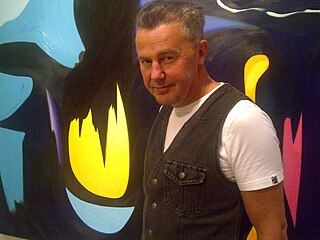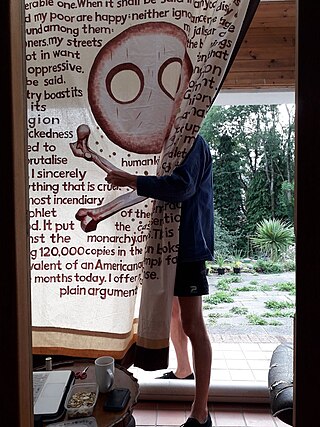Related Research Articles

Ebbw Vale is a town at the head of the valley formed by the Ebbw Fawr tributary of the Ebbw River in Wales. It is the largest town and the administrative centre of Blaenau Gwent county borough. The Ebbw Vale and Brynmawr conurbation has a population of roughly 33,000. It has direct access to the dualled A465 Heads of the Valleys trunk road and borders the Brecon Beacons National Park.

The Arts Council of Wales is a Welsh Government-sponsored body, responsible for funding and developing the arts in Wales.

The National Eisteddfod of Wales is the largest of several eisteddfodau that are held annually, mostly in Wales. Its eight days of competitions and performances are considered the largest music and poetry festival in Europe. Competitors typically number 6,000 or more, and overall attendance generally exceeds 100,000 visitors, the highest recently being 186,000 attending the 2024 festival in Pontypridd. The 2018 Eisteddfod was held in Cardiff Bay with a fence-free 'Maes'. In 2020, the event was held virtually under the name AmGen; events were held over a one-week period.
This article is about the particular significance of the year 1993 to Wales and its people.
This article is about the particular significance of the year 1987 to Wales and its people.
This article is about the particular significance of the year 1986 to Wales and its people.
This article is about the particular significance of the year 1949 to Wales and its people.
This article is about the particular significance of the year 1927 to Wales and its people.

Ivor Williams was a Welsh artist.
Sir Alun Talfan Davies was a Welsh judge, publisher and Liberal politician.

Martyn Jones is a British contemporary painter who works from his studio in Cardiff, Wales.
Ruth Jên is a Welsh artist, working in the old shoe shop in the village of Tal-y-bont, Ceredigion.
The Pontarddulais Male Choir is a Welsh male voice choir from Pontarddulais near Swansea, Wales. It is the most successful choir in Wales and is internationally renowned having performed in many parts of Europe as well as Canada and the United States.
Philip Nicol is a Welsh painter.

David Garner is a Welsh installation artist known for his use of found objects and overtly political themes.

Art in Cardiff refers to the culture of visual arts in Cardiff, capital city of Wales. The visual arts in Cardiff have a much more recent history than many British cities, due to it being a very small town until rapid growth took place in the mid nineteenth century. Cardiff School of Art originated in 1865 and the first major public art exhibition took place in 1870. The town became a city in 1905, after which time it gained further importance, for example with the creation of a new National Museum. Into the 21st century it has a thriving art scene.

The Gold Medal of the National Eisteddfod of Wales is awarded annually in three categories for excellence in Fine Art, Architecture, or Craft and Design.

Y Lle Celf is an annual art, craft and architecture exhibition held during the National Eisteddfod of Wales, claimed to be the biggest temporary art exhibition in Europe.

The Maes is the site of a Welsh eisteddfod, such as the National Eisteddfod or the Urdd Eisteddfod. All the main events and event venues are located on the Maes.

The 2018 Cardiff National Eisteddfod was held in Cardiff Bay, Wales, from 3 to 11 August 2018. It was the seventh time the National Eisteddfod of Wales had been held in Cardiff. The 2018 event was billed as the Eisteddfod with "No fences" because it dispensed with the traditional enclosed 'Maes', or entrance fees to the event location. It made a £290,000 loss, but its popularity led to the suggestion of future Eisteddfods without fences.
References
- 1 2 "The Welsh Group – Ivor Davies". thewelshgroup-art.com. Retrieved 9 January 2015.
- 1 2 3 "Ivor Davies". BBC. Retrieved 26 December 2012.
- ↑ Davies, Ivor (1975). "Certain aspects of art and theory in Russia from 1905 to 1924 in their relationship to the development of avant-garde art and ideas in the West".
{{cite journal}}: Cite journal requires|journal=(help) - 1 2 3 "Ivor Davies". Rcaconwy.org. Archived from the original on 5 February 2015. Retrieved 26 December 2012.
- 1 2 "Byd o Liw". S4C. Archived from the original on 5 May 2013. Retrieved 26 December 2012.
- ↑ "Ivor Davies". The Welsh Group . 2016. Retrieved 10 March 2016.
- ↑ "Knights Bachelor" (PDF). BBC News. 28 December 2006. Retrieved 2 January 2015.
- ↑ "Ivor Davies to open Y Lle Celf at the Vale of Glamorgan Eisteddfod | The National Eisteddfod of Wales". Eisteddfod.org.uk. 11 August 2012. Archived from the original on 11 March 2012. Retrieved 26 December 2012.
- ↑ "UK | Eisteddfod art turns political". BBC News. 4 August 2002. Retrieved 26 December 2012.
- ↑ "Visual Arts Exhibition, Y Lle Celf at Blaenau Gwent" (PDF). 15 October 2009. Archived from the original (PDF) on 5 July 2011. Retrieved 2 January 2015.
- ↑ Germaine Greer (19 September 2010). "Catholic art was once the domain of Titian. Now, we get Susan Boyle | Art and design". The Guardian. London. Retrieved 26 December 2012.
- ↑ "CatholicHerald.co.uk » Pope to bless mosaic with holy water from Wales". catholicherald.co.uk. Retrieved 2 January 2015.
- ↑ "Ivor Daves: Silent Explosion At National Museum Cardiff", CCQ, 13 November 2015, archived from the original on 16 November 2015, retrieved 13 November 2015